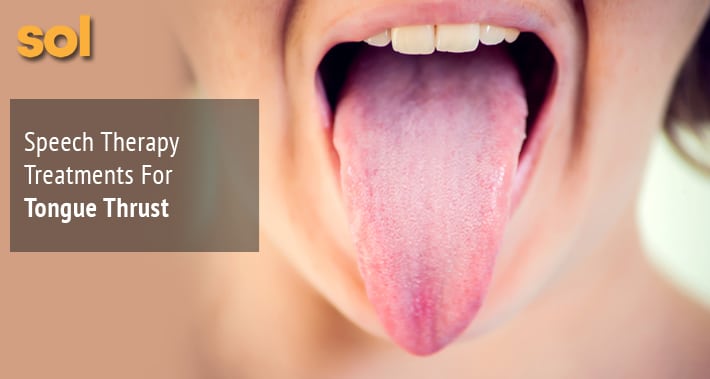
Tongue thrust is preventable condition that often develops during infancy or childhood.
If left untreated, it will persist into adulthood and can cause complications that affect your speech.
A team of healthcare professionals is usually required to address the condition once diagnosed.
Speech therapists are an integral part of this team because they can address multiple aspects of the condition.
If your child is diagnosed with tongue thrust, it’s important to make sure that speech therapy treatments for children become a core focus of your treatment plan.
Now, let’s dive in.
What Is Tongue Thrust?
Tongue thrust is a condition that occurs when your tongue presses too far forward in your mouth.
This results in an abnormal orthodontic condition called an ‘open bite’.
There are wildly varying statistics on how common tongue thrust is, with one study claiming 2.7% of children have it, and another claiming 74% of children are tongue thrusters.
Symptoms Of Tongue Thrust
There are different symptoms of tongue thrust that present depending on your age.
Let’s find out more, starting with symptoms of tongue thrust in babies.
In Babies
In babies, the main symptom of tongue thrust is visible when there’s too much forward movement of their tongue.
You’ll see this while your baby is swallowing or attempting to babble.
Their tongue will push forward into their mouth.
If they’re at the age where they have some teeth, their tongue will press into the back of their teeth noticeably.
Some other signs that your baby is developing tongue thrust include:
- Their tongue tip protrudes between their teeth during resting, swallowing, and speaking
- They noticeably breathe through their mouth
- They are unable to close their lips completely
- As they age, they have developed an open bite, which is when their front teeth don’t meet when their mouth is closed
- They might also need speech therapy for speech sound disorders as they age to correct a lisp
If you notice your child has tongue thrust, it’s a good idea to seek early intervention speech therapy, since it has been shown to improve results.
In Adults
In adults, the symptoms of tongue thrust around the mouth are similar to those in children.
But, you might also have developed some other signs that point to the condition.
These include:
- Thrusting your tongue while you sleep
- An elongated facial structure because you can’t close your mouth or swallow normally
- A larger than average tongue
- Difficulty biting foods
While tongue thrust is similar with adults and children, speech therapy for adults with tongue thrust is significantly different.
What Causes Tongue Thrust?
There are many possible causes of tongue thrust that can occur during your childhood.
Some of the common causes include:
- Allergies
- Tongue tie
- Poor swallowing habits
You can also develop tongue thrust during your infancy.
Some causes of tongue thrust during infancy include:
- Long term reliance on sucking on objects or fingers
- Allergies and chronically swollen tonsils
- A specific swallowing pattern called reverse swallow
It is very rare to develop tongue thrust as an adult, but not impossible.
Complications From Tongue Thrust
Remember, if you don’t treat tongue thrust, it will carry forward into adulthood.
It can also cause malformed teeth because of the constant pressure of your tongue against your teeth.
This creates an open bite, which is when a gap opens up between your middle top and bottom teeth.
In addition, growing with an open bite can cause your facial shape to elongate over time and your tongue will eventually stick out between your teeth.
It can also cause long-term damage to your speaking ability, and create a lisp over certain sounds.

Diagnosing Tongue Thrust
There are many different healthcare professionals who can diagnose tongue thrust.
This list usually includes general practitioners, pediatricians, dentists, orthodontists, and of course, speech pathologists.
In order to diagnose tongue thrust, your evaluator will pay attention to how you swallow, and where your tongue is placed when swallowing.
After being diagnosed with tongue thrust, you’ll most likely work with a team of interdisciplinary healthcare professionals to reduce the impact of the condition.
This is to ensure the best possibility for success.
Speech Therapy Treatments For Tongue Thrust
Speech therapy treatments for tongue thrust can be very effective, both for your speaking abilities and your swallowing abilities.
The treatment plan is similar regardless whether it is for a child or an adult.
Your speech therapist will create a plan after evaluating your needs and help you to correct any impediments that resulted from your tongue thrust condition.
It’s especially important that you maintain your treatment plan, because without ongoing therapy your resolved tongue thrust can reverse itself over time.
Let’s find out more about some strategies to reduce tongue thrust.
1. Stopping Non Nutritive Sucking
One key strategy to reduce and prevent tongue thrust is to break any sucking habits your child may have.
Your goal should be to stop this habit by age three.
Your speech therapist can give you strategies to help with this that are all based on positive reinforcement.
You’ll want to encourage and praise appropriate mouth behavior to help your child break their habit.
On the chance it persists, the hard stop is by the time your child’s adult teeth begin to show.
If they are still sucking by this age, their risk factor for developing tongue thrust will increase quite a bit.
2. Developing A Healthy Oral Resting Posture
Before doing any dental work, your speech therapist will work with your child to create or recreate a healthy resting relationship between your child’s tongue, lips, teeth, and jaw.
This includes working with your child to reduce their mouth breathing, which can negatively impact their resting posture.
This is important, since with just dental work, they will eventually revert back.
3. Stabilizing Their Nasal Breathing
It’s important to have any structural or physiological challenges to nasal breathing ruled out.
Your speech therapist can only teach your child to breathe through their nose if they are physically able to breathe through their nose.
This includes investigating the potential for allergies if that is causing them any problems.
Your goal is for your child to have a closed mouth resting position, breathing easily through their nose.
4. Addressing Their Articulation Issues
Finally, your speech therapist will work to correct their speaking and articulation challenges once their breathing and oral resting posture have been achieved.
It has to happen in this order to improve their chances for success.
Any speaking challenges can be worked out with therapy once the underlying systems that support speech are addressed.
This includes any lisps or other articulation challenges.
Book An Appointment With Sol Speech And Language Therapy
You can see that there are a lot of treatment options available to you if you think you or your child might have tongue thrust.
Your best bet is to work with a team of healthcare professionals that will address different aspects of the condition based on their expertise.
Our licensed speech pathologists can play an integral part of your healthcare team.
Book your appointment with Sol Speech And Language Therapy today to schedule an evaluation at one of our Texas clinics.
6448 E Hwy 290 Suite E-108,
Austin, TX 78723
(512) 368-9488
» https://g.page/r/CfRfhOpEQm7BEAE
Sol Speech & Language Therapy
555 Round Rock W Dr E-221,
Round Rock, TX 78681
(512) 808-3953
» https://g.page/r/Cb5pwCTosSEfEBM
Sol Speech & Language Therapy offers personalized skilled intervention to those struggling with their speech and language skills. Services offered include screening, consultation, and comprehensive evaluation. We also provide one-on-one and/or group therapy for speech sound disorders, receptive/expressive language delay/disorder, stuttering/cluttering, accent reduction, and much more.